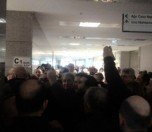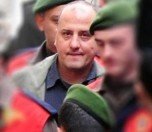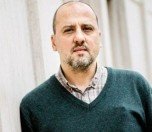Click to read the article in Turkish
After being arrested in the Oda TV trial on March 6, 2011 and being released on March 12, 2012 after one year behind bars, Ahmet Şık has been arrested again after five years on the charge of "propagandizin for the Fethullahist Terrorist Organization (FETÖ) and Kurdistan Workers' Party (PKK).
Şık, taken into custody on December 29, 2016 and arrested on the next day, pleaded in the final hearing of ODA TV trial after being released five years ago in the same trial.
Şık's defence reads as follows:
Let's start with the nearest example. A one-man dictatorship, which would make past and present juntas jealous with its deepening repression and authoritarianism, has been being disguised as democracy. A referendum is being pushed through under the name of "national will" under unjust and biased circumstances, where media is almost entirely captured and completely taken hold, those who say "No" are labelled as "terrorists", and no one doubts that the results will be manipulated. We all witnessed how the same national will declared in June 7, 2015 general elections was disregarded because it threatened the existence of their oligarchical rule. They did not hesitate for a moment to start a new bloodbath once they decided that the nation's will reached the wrong conclusion. The entire country turned into a graveyard at the end of the "Peace Process", for which they initially promised to take all necessary risks and measures. Those who want us to believe that what we have finally reached at the end of our democratic development is "Advanced Democracy" also claimed that freedom of press had never been better in Turkey, using aphorisms such as "We have set you free from your leashes". However, national and international bodies report that Turkey is now the world's largest prison for journalists. We should also acknowledge that Turkey has the highest breaches of freedom of expression among the Council of Europe's 47 member states. In the last 10 years, "coup" and "coup plotters" have been the most frequently used words by the government and their adherents. Every single act against the government was denounced as "coup" and every opponent was easily labelled as a "coup plotter". Nonetheless, in Turkey's long political history of military coups all juntas, except from February 28, 1997 intervention, were much-admired by Islamists in Turkey. While the 12 September 1980 junta's institutions had remained and prevailed their positions, and while its fascist spirit penetrated through the depths of the state, the claim that a coup booster Islamist government has been "calling coups and putschists to account" was rather interesting. The country was supposedly "demilitarized" through court cases that were initiated 10 years ago. These cases were plotted based on a series of frames whose dossiers were interspersed with some remnants of counter-guerrillas without mentioning their real crimes in the investigations. Even more interesting than their so-called "religious and vindictive" partisans becoming militarized by the government itself while the demilitarization was in action was that those who took the responsibility of triggering these conspired cases with the AKP's political support got on the stage as putschists only seven months ago. The government, which turned its old accomplice's bloody attempt that left lots of suspicious and dark questions behind into a "god blessed" opportunity, carried out a junta regime which makes the encumbered putschists jealous. In sum, the responses given to questions like "What is a coup?", "Who is a putschist?", "How does demilitarization take place?" show differences based on everybody's political engagement, though these questions have straightforward answers in real democracies. The biggest paradox of this democracy illusion, for which it is possible to present many other examples, is the Justice and Development Party itself. They represent a pitch-dark mentality, yet the emblem of their party is a shining light bulb. They call the process of turning a country into a cement republic via looting the state and country resources as development. Though there are many other cases similar to this one, this case alone suffices to explain what the word "justice" in their name means. I will summarize what it is, but first, it would be appropriate to draw attention to another incident of injustice of which I am a subject as well. Some persons that need to be here; two of my attorneys, Bülent Utku and Akın Atalay, and their colleague Kemal Güngor, are not present. Not only those but my colleagues who did not leave me alone all the time I was in custody, Murat Sabuncu, Kadri Gürsel, Gökay Öz, Turhan Günay, Hakan Kara, Musa Kart and Önder Çelik are also not among the observers. Due to an investigation that targets our newspaper Cumhuriyet in order to put journalism on trial using a plot which resembles the plot in this trial, they were taken in custody 108 days ago. The investigation is carried out by prosecutor Murat İnam who is a "FETÖ suspect" himself. The one who has appointed İnam for the prosecution is İstanbul Public Chief Prosecutor İrfan Fidan. Fidan's brother is claimed to be Gülen Community's _which is being called "FETÖ"_ person in charge of the teachers in Fatsa [district] of Ordu [province]. These are the ones who accuse my attorneys and colleagues who have been behind bars for 108 days, of being "members of FETÖ". I was made the defendant in this trial by a plot of the Gülen Congregation and it was expected that my case, together with those of my co-defendants, was going to be dismissed. In spite of this, I am being held in custody as the defendant in another case, in which I was being accused of "publicizing FETÖ". In that case, which is expected to end soon, again my journalistic activities are the subject of the investigation. This indicates that there is no other judiciary but the prosecutors and judges of the Gulen Congregation called "mankurts". At that time, I was also subjected to the terror of being in custody just to keep some crimes away from the public eye. Whatever is done, nobody should doubt that the truth that is wanted to be kept secret by not being written, talked, and heard will eventually be exposed. The crimes in Syria, which bear the footprints of MIT [Turkish Intelligence Service]; and the questions whether a bloody uprising to create a fake history is a controlled coup to create a much-needed chaos, will certainly be written about. Under the rule of evil, we need the truth more than anything; because if the truth is told, the evil cannot say the last word. Knowing that not telling, not remembering, and not reminding will be a denial (repudiation) of ourselves; let us remind everybody the evil that spans the time from the recent past to today. If it were left to the prosecutor and the judges, this trial would have been over in the last session. A summary report, which was haphazardly written, avoiding to describe the issue at hand, trying to hide the perpetrators of the plot and saying "whatever happened has happened, forget about it" delayed the verdict to another session. The carelessness in the preparation of the report was to such an extent that it even omitted some of the names of the defendants. I have read a lot of indictments and summary reports sometimes as a defendant targeted due to my journalistic activities and sometimes required by my profession. I have encountered a lot of indictments that were far from being a legal document, about which I said "this cannot be an indictment". Especially in political trials, I can easily count many political characteristics of the indictments and summary reports asking for a conviction. A case in which the indictment asked for my conviction and the summary report asked for my acquittal is just one of them. Even if the summary report asks for an acquittal, it does not negate its political character. The summary report is not indicating, describing, explaining. It is just keeping silent. It is asking for acquittal but hiding it. It is a summary report that does not mention Gülen congregation by name, which does not talk about its collaborator AKP, that hides the roles played by Fethullah Gülen and Recep Tayyip Erdoğan. As such, it becomes a crime committed against the truth, just like the indictment itself. There cannot be such a summary report. Since the beginning of the investigation a lot changed in the file. A lot of developments occurred. In spite of the pitiful situation of the judiciary, my attorneys, who have not yet lost their belief in the rule of law, became the only connection between my case and the law. They talked about the basic rights and freedoms, their importance and their current status. They explained why the freedom of thought and expression and free media are untouchable. They patiently talked about why journalism cannot be tried and why journalism is not a crime. It was not given up on the explaining their crimes to those who target the freedom of thought and expression, who try to eliminate free media, who try to put journalism on trial. It is still necessary that we don't give up. Government is not an empty concept. From past to date, those who have seized the This case had police officers, who were a gang wearing state uniforms. They were a gang who followed their targeted "enemies", listened and recorded their phones, and seized their computers and e-mails by hacking. They were policemen who tried to show the works of journalism as crime. They were policemen who fueled their police reports with fabricated evidence. This case had a prosecutor and judges. They were a "sacred" mafia who had instrumentalized religion, and were the gunmen of Gulen congregation's in judicial organization. With the approval and support of the current administration, they created a bitter dark hell using slander, defamation, gossip, lies, indecency, and infamy, while naming it "unbiased-independent" judiciary. They tried to judge journalism by lying shamelessly. This was nothing but organized and primitive aggression of the people who handed over not only their minds and personalities, but also their ethical values, ethical principles and consciences to a single person or single mentality. They were too many, but let's recall the names of two particularly. The name of one was Zekeriya Öz. His ex-crime partners, today's rivals, honored him as a "hero" when they were working together and some interest seekers attempted to make a sculpture of him. Now the only thing to say about Zekeriya Öz, the fugitive prosecutor of today, is that he is the brief summary of the wretchedness of Turkish judiciary, which has been pathetically far away from dispensing justice from the past to the present. The name of another one was Mehmet Ekinci. He was the head of the court commission, who pretended that they were "judging" us. He signed the orders that extended the length of our imprisonment after every hearing. That same Mehmet Ekinci immediately escaped when he himself became the accused. He had been on the loose until he was caught recently. Affirming the statement that "patriotism is the last resort of a scoundrel", he was shouting on his way to the prison that he was a "patriot". This case had its politicians. Using the mechanisms of democracy that they despise, and with the power they obtained through the exploitation of religion, they turned a mafia organization into their partner. They had total trust in their accomplice with the conviction that "they were also aiming to reach the same destination" as theirs. Loving them wholeheartedly, they "gave them whatever they wanted". Both claimed that they were religious but their religions and sacred book only addressed their own interests. They told the lies that "they were calling the coup supporters into account" or "they were judging the deep state". The prime minister of the time even proclaimed that he was the "prosecutor" of the plotted cases. Telling lies for their cause was permissible, hence they did so. Even if it was known that our freedoms were seized by plots and by turning our occupational activities into subjects of investigation, they tried to cover their lies and sins with the cliché of every dictatorial regime: "terrorists, not journalists". When the two accomplices fell out with each other over the possession of power they had gained through fraud, plots, and ambushes, they said that they were "deceived". On their crime books, it was written that "they were hand in hand to deceive everyone together". This case had the blind supporters who believed in their legitimacy, as there were the ones who realized the injustices and opposed them. There were also the ones who were aware of the injustices, but kept their silence out of fear. Those were the most numerous. Just like today, they were waiting in a deafening silence for someone to rescue them from the deep darkness they had fallen into. But they fell deeper into that darkness for keeping their silence as indistinct spectators or audience of these endless offenses. Indeed, what was to be done was evident then, as it is today: instead of enslaving ourselves into unrealistic dreams, choose to possess the truth and say no to this oppressive darkness. This case had its journalists. They were humble. They claimed their jobs and the honor of their colleagues. A handful of these put their names in history by creating the best examples of friendship and solidarity by taking all sorts of risks. We were the "suspect" journalists who were the subjects of an indictment, which redefined journalism and aimed to limit the boundaries of press freedom for the sake of their crime establishment. We were accused for our news reports, comments, interviews, and published/unpublished books because we refused to fall into the trap of the political power, which tried to normalize its totalitarianism by shaping even the everyday language. We pursued the truth, which was denied a life in the presence of obedience. We knew that those who surrender to the contagious fear become slaves while the journalists who stay attached to the facts by risking their assets are free. The most precious legacy that our exemplary predecessors left us is the fact that reporting what power holders want us to convey is not journalism. The ones who left us this heritage were similarly punished by imprisonment or exile in the past. When these punishments fell short, they wanted to silence them by bombs or bullets. The anti-journalist campaigns of power holders have been in existence since journalism emerged in these territories. Yet, these are useless efforts. Because, whoever you are, you cannot fight against an idea taking its power from the facts. Even if you believe that you do so, you have no chance to win. You will lose again. (Translated by Solidarity for Freedom of Ahmet) |
(EKN/YY/BK/DG)
Drawing: Rewhat Arslan













